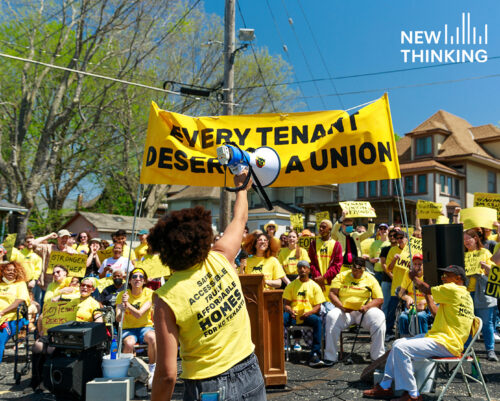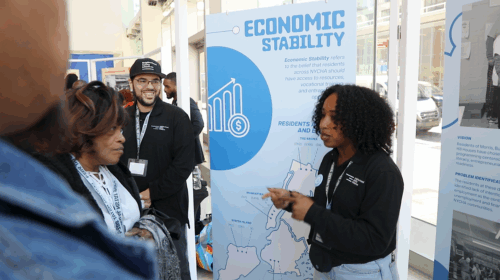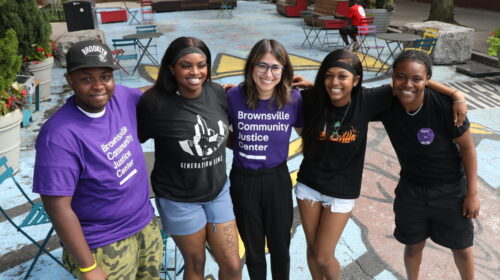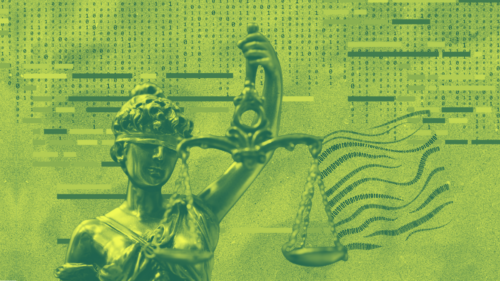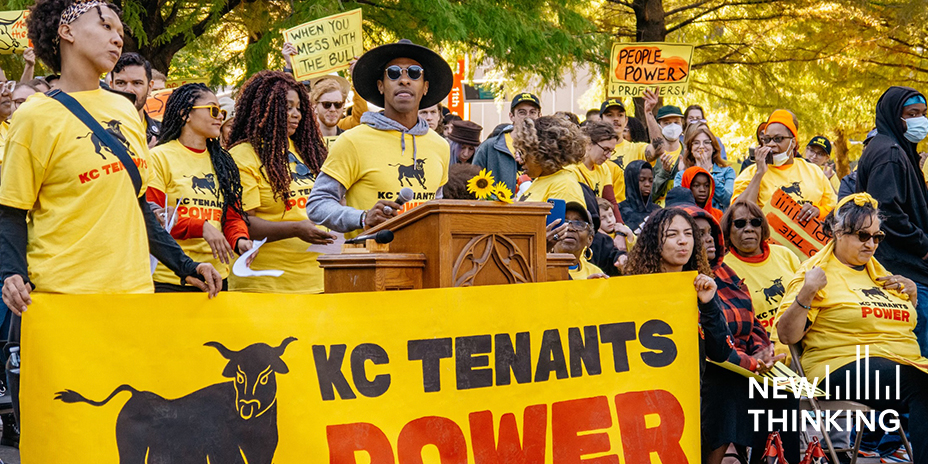
Image: Beeh Becvar and KC Tenants
Housing courts are finding themselves unprepared to deal with the idea of having representation on both sides, that they actually have to hear both sides of the story.
In most places across the country, you can lose your home, your immigration status, even your children, all without the state giving you the right to a lawyer.
Sixty years ago, in the landmark Gideon v. Wainwright decision, the Supreme Court enshrined the right to counsel for any poor person facing prison time. That right has proved far from a guarantee of effective representation in criminal cases, as the first episode in New Thinking’s series on Gideon’s legacy explored.
But when it comes to civil cases, even that right on paper rarely exists.
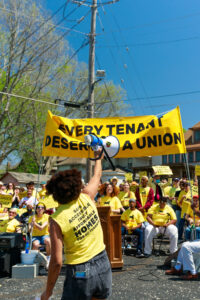
Kansas City secured its right-to-counsel law in 2021. Image: Sam Blaufuss and KC Tenants Power
In the series’ second episode, New Thinking profiles the fight to secure lawyers for people facing eviction and the radical impact right-to-counsel is having in Housing Court.
The Gideon decision was both sweeping and critically incomplete. There is little chance of something similar emerging for the civil side from the current Supreme Court. But looking at how Gideon has played out, it’s not even clear that would be desirable.
The campaign for civil representation is instead being waged by local tenants and organizers, responding to local demands and facts on the ground.
It’s piecemeal and slow. It’s also working.
The following is a transcript of the podcast:
John POLLOCK: When you think about the consequences, the unbelievable consequences of winding up on the street—and the idea that that’s done in 90 seconds, it’s almost hard to believe. But that’s the nature of what housing court currently looks like.
Matt WATKINS: Welcome to New Thinking from the Center for Justice Innovation. I’m Matt Watkins.
In most places across the country, you can lose your children, your home, your immigration status, al without the state giving you the right to a lawyer.
In our last episode, we talked about the Supreme Court’s Gideon decision. Sixty years old this year, it enshrined the right to a lawyer for any poor person facing prison time.
That right has proved far from a guarantee of effective representation. But when it comes to civil cases, even that right on paper usually doesn’t exist.
Today, we’re going to look at how that absence plays out in one critical forum: housing court. And we’re going to hear about efforts across the country to guarantee lawyers for people facing eviction.
This is the second in our three-part series on the anniversary of Gideon. And the decision, as we talked about in that last episode, was both sweeping and critically incomplete. For the civil side, there’s pretty much zero chance of anything similar emerging from the current Supreme Court. But looking at how Gideon has played out, it’s not even clear that would be desirable.
The battle for civil representation is instead being fought by local tenants and organizers, responding to local demands and facts on the ground.
It’s piecemeal; it’s slow; but it’s also working.
Here’s our documentary: Uncivil Justice.
CHANTEL: I could not afford an attorney for this long to do this. This is a lot. This is a long process. And we’re still going through it. We’re not even halfway done yet.
WATKINS: Chantel arrives for her meeting with her lawyer lugging a tote bag stuffed with papers. That’s far from the only weight she’s carrying.
Chantel and her mom were rent-stabilized tenants in the same Brooklyn apartment complex for almost 50 years. Two years ago, her mother died. From her hospital bed, she kept asking Chantel if her lease had been renewed.
Their building had recently been bought by a large investment company.
When Chantel reached out after her mother’s death to say the lease would now need to be in her name, the company responded with condolences and a 10-day notice: vacate the apartment or we’ll take you to court.
CHANTEL: I received the notice and I am stunned. I’m like, okay. So I’m thinking in my head that I don’t need counsel, so I didn’t have a lawyer. I go to court, someone from Legal Aid is walking around. She’s like, “Do you have a lawyer?”
I’m like, “I don’t think I need one.” She’s like, “Let me look at your paperwork.” She looked at my paperwork and she’s like “You need a lawyer. There’s no way you could… This sounds like a succession case.” I’m like, “What is that?” I had no idea. She tells me “Fill this form out. We’re going to get you a lawyer.”
And that’s how Mimi Rosenberg walked into my life. I am grateful that she’s my lawyer. She cares about me a lot.
WATKINS: Sitting beside Chantel, Mimi Rosenberg passes over some tissue. An attorney with Legal Aid, Rosenberg has been representing tenants like Chantel for almost 40 years. As one of her younger colleagues told me, “Mimi knows everyone in Brooklyn.”
Rosenberg recently put in her papers to retire. Then, deciding there was still too much to do, she tried to take it back.
Mimi ROSENBERG: I believe in a diverse city. I believe in inclusion and equality, and I think it is in a state of absolute threat. I don’t think I’m entitled to rest yet.
WATKINS: The threat to Chantel’s rent-stabilized apartment comes from her building’s new owners, and from real estate listings describing where she grew up as “Brooklyn’s most sought-after neighborhood.” Units that used to be rentals are being glossily renovated. A two-bedroom like Chantel’s recently sold for just under a million dollars.
CLIP: Watkins: So, you must feel right now like you have a nice place to live, two bedrooms at a reasonable rent, and you’re being told, “Nah.” Chantel: Exactly. “You can’t stay here. No. You don’t live here.” To have somebody tell you that you don’t live… I’ve lived in this area since 1975.
WATKINS: It’s called a succession case. The company that now owns Chantel’s building argues she can’t legally take over her mother’s lease. This would mean the end of the unit’s rent-protected status, freeing it for the full condo makeover.
Succession cases are enormously complicated, and often that’s felt like the point: ordinary tenants, with no right to a lawyer, had little chance of fighting them.
CHANTEL: I’m glad I have a lawyer! I’m definitely grateful for that because I would not be able to navigate the housing court system at all. It’s like speaking another language. Half the time I have no idea what Mimi is saying or doing. She’ll tell me she’s going to meet with the opposing counsel and discuss this, this, and this. For her, it’s like English. For me, it’s like “What did she just say to me? I have no idea.” So…
WATKINS: Local organizing is a big reason why Chantel has Mimi as her lawyer, and has her for the many months this case is going to take. Six years ago, after a grassroots campaign, New York City passed the first Right to Counsel law in the country for tenants facing eviction. It’s underfunded and overburdened—critically say the service providers—but Rosenberg says even so, it’s prevented thousands of evictions.
ROSENBERG: If you don’t have an attorney, there is no way that you can flesh out the defenses, the affirmative defenses, the counterclaims that may enable you to prevail or at least to live to fight another day. Witness the enormity of the numbers of people who were homeless and people who were homeless and on the street, as well. Almost all of them, you can be assured, never had counsel, and may have had really good cases that could have been presented but there’s no way a layperson can joust with an educated, trained lawyer from the other side.
WATKINS: New York City’s law has inspired similar efforts across the country, and we’re going to hear more about some of those. But for now, let’s focus on those educated, trained lawyers representing landlords—and only landlords—in most jurisdictions across the country.
SOUND UP: string quartet+
WATKINS: The day I visit Nakeeb Saddique a lunch-hour string quartet is playing Leonard Cohen’s Hallelujah in a courtyard of Brooklyn’s Metrotech office park. Siddique is the Director of the Housing Unit at Legal Aid’s Brooklyn Neighborhood Office. At the time we spoke, Legal Aid was in a dispute with its own landlord and Saddique and his colleagues were working out of a trendy We-Work-style space. It’s an odd setting for public defenders. In fact, three decades ago, an entire low-income neighborhood was demolished to make way for the complex we’re in. With her long memory, Rosenberg refuses to work out of the space.
For Siddique, prior to right to counsel being passed, it was clear who housing court was operating for.
Nakeeb SIDDIQUE: It was run by attorneys, a small number of attorneys. The landlord attorneys, certainly, and who naturally came to know the judges quite well, and vice versa.
I’m not suggesting that there was anything necessarily inappropriate, but it was very much, it’s what you might find in a small town. I’m a Brooklyn guy, but I’ve once in my previous life, I got to observe court proceedings in rural Pennsylvania. I sometimes reflect on how it felt a little like that. Everybody sort of knew each other except that you could tell that everybody knew each other. They didn’t know you, certainly they didn’t know your client. And there was a kind of feeling of outsiderness, even though every single day, it’s mostly poor people and working class people who were there.
POLLOCK: The housing courts really are finding themselves unprepared to deal with the idea of having representation on both sides, that they actually have to hear both sides of the story.
WATKINS: That last voice belongs to John Pollock, the coordinator of the National Coalition for a Civil Right to Counsel.
I asked him: tenants without lawyers are obviously in an unfair fight. Can judges intervene, at least to ensure some procedural fairness?
POLLOCK: The problem is they’re not allowed to really go very far down that road because it compromises their neutrality as they… Or at least that’s how they’ve interpreted the rules. We do see some judges pushing as far as they can along those lines, where the ethics rules allow.
And then the opposite is, you have cases, and I’m not talking about a few, but you have cases where the pleadings are obviously defective, the landlord has not filed something with the pleading that’s required by law, and the judge does not… They do not act, they do not see that, and then say, “Landlord attorney: This is obviously defective. You need to refile, it needs to start over.” They don’t do that. They wait for the tenant to, and the tenant does not know to do that, so it doesn’t happen. That’s obviously a very… There’s no real gatekeeping.
Just to give an anecdote from… I talked to one judge in a state where she told me that she was a new judge in housing court, and she was advising tenants in court. She said that when they showed up unrepresented, she said, “It’d be good if you got a lawyer.” And one of the senior judges pulled her aside and said, “You’re not allowed to say that.” And that’s how far the problem goes with the way that their roles are interpreted.
WATKINS: The combination of New York’s example and local organizing and advocacy means the right-to-counsel movement is spreading: 17 U.S. cities, one county, and four entire states now have some version of a tenant right to counsel.
So, what happens when renters facing eviction get lawyers? John Pollock again.
POLLOCK: Tenants who are not represented lose almost automatically, if they actually have the ability to appear in court and not be completely overwhelmed by the process that really does crush so many people into the ground.
With counsel, what we’re seeing from the right to counsel programs is nothing short of staggering. In New York City, 84% of the tenants are remaining in their homes. In Cleveland, 93% of the tenants are avoiding eviction or an involuntary move. In Kansas City, in the first three months of the program, the eviction rate dropped from almost 100% to around 20%.
Everywhere that the right to counsel is being rolled out, it’s proving what we already knew from decades of data looking at representation by legal aid.
WATKINS: Organizers and tenants secured New Orleans’ right-to-counsel law last year. New Orleans has a stark housing affordability crisis made worse by all of the short-term Air BnB rentals taking housing off the market.
Yasin Frank Southall is a housing organizer with Jane Place Neighborhood Sustainability Initiative. Like Pollock, he says the effect of the right to counsel law has been dramatic.
YASIN FRANK SOUTHALL: Every person we talk to, they’re going to court, they’re talking with a lawyer. It’s very, very effective in keeping people housed. We see less cases of people calling us and going like, “I was evicted.” Especially when people are legally within the right, or their landlord has concocted some excuse to evict them that’s totally bogus, people are fighting back.
And we have more people contacting us about, “Hey, I had this situation happen to me and I want to stay in my house. I stopped my landlord once. What can I do to prevent this again?” It’s a huge shift in how people are engaging with us. And it’s wonderful and beautiful.
WATKINS: People are fighting back. Let’s stay with that thought for a moment.
MAK: With organizing, there’s a strategic long haul to it where a community is committed to each other to build power to win what they want to win.
WATKINS: Mason Andrew Kilpatrick, or MAK, was an organizer with KC Tenants when we spoke. KC Tenants is Kansas City’s citywide tenant union. It helped to lead the successful fight for Kansas City’s right-to-counsel law two years ago.
As with other jurisdictions with these laws, outcomes for tenants in housing court have pretty much flipped: where once eviction was the norm, now it’s people staying in their homes.
But for MAK, right-to-counsel is about more than just courtrooms. I asked MAK what led KC Tenants to start its organizing around the law.
MAK: We realized that this was necessary because we had realized within our union we were losing a lot of leaders and a lot of neighbors, friends, and family by eviction. We noticed a lot of folks were becoming homeless because of this.
In Missouri it’s legal to basically discriminate against someone with an eviction for up to seven years. We had families and friends, single mothers of multiple kids, basically being sentenced to homelessness for seven years and more.
And the weight of that emotionally was getting too much.
The other strategic part that we considered was that in the state of Missouri, when you face an eviction, chances are you’re probably going to be evicted. And there weren’t any protections and it’s not easy to find a lawyer.
And because tenants know that, there’s a lot of fear in organizing and fighting back against landlords because they knew how easy and how cheap it is to file an eviction in the state, they knew how easy it is to lose and be evicted. It was really hurting our ability to organize and build new members and leaders and unions within the city.
When I’m out on the field having one-on-ones with folks and asking tenants if they’re interested in organizing against their landlord, the one thing that was always stopping them was, “I can’t afford a lawyer and if they evict me I lose my home, and I’m not going to lose my home. This is everything to me, so I’m not going to participate.”
So, when we combined that strategic element and then this deeply emotional element to it, we knew that this was a call that made a lot of sense. And we’ve noticed that change. Since passing tenants right to counsel, several more tenants unions have been popping up. A lot more tenants are educating themselves about their rights and specifically their right to counsel.
WATKINS: My home is everything to me. Housing advocates will tell you that’s true in more ways than one. Eviction triggers the loss of more than just a roof over your head. And the weight of those losses is not being equally felt. Here’s MAK again.
MAK: With tenants right to counsel, we knew from our research that it was older Black women that were the most impacted by evictions. Many folks in our base are older Black women. And we knew that this couldn’t be a process where advocates, academics, or lawyers who are usually mostly wealthier and white, should take the lead in charge on this.
WATKINS: For John Pollock, with the National Coalition for a Civil Right to Counsel, right to counsel laws need to benefit most the people who’ve suffered most from their absence. This is where Pollock says the role of organizers, and the broad view of power they take, has been so essential.
POLLOCK: One of the primary motivators for us and many others is looking at who it is that’s facing these proceedings. And it’s people of color everywhere.
That for us is extremely important to recognize that the justice system is letting them down and letting them get crushed under the wheel—under the boot of essentially the housing courts.
And the way that race affects the way right to counsel works also can’t be ignored. We have to make sure not just that we get the money, not just that we hire a bunch of attorneys, but that the delivery of the right to counsel furthers race equity too.
It has to be done in a way that reaches people, that actually reaches all communities, especially ones that may have been more disempowered, less likely to engage than others because of how long they’ve been crushed by the system.
There’s like a throughline all the way from: who are you bringing into the movement? Are you activating voices? Are you giving people power to speak?
And then are you implementing the right to counsel in a way that they continue to have a voice and that they’re reached essentially and empowered in the way that right to counsel is delivered.
Organizers will tell you that right to counsel can, if it’s not done right, it can disempower tenants, and that would be a disaster. We can’t have a system intended to change things that actually is partly furthering the race-inequitable nature of our justice system.
WATKINS: Disempowering tenants, particularly tenants of color. For too long, that has seemed to be the primary effect of many housing courts. Here’s Nakeeb Siddique again, the director of Brooklyn Legal Aid’s housing unit.
SIDDIQUE: And housing court, let’s face it, it’s a poor person’s court. It’s a poor woman’s court, right? And I got to work in federal court once in Manhattan. That was a rich man’s court. And I would like the same deal for our clients in poor woman’s court here in Brooklyn that, you know…
It doesn’t feel the same. It doesn’t feel… There isn’t the same level of dignity, the same level of information or honesty even, or process and decorum. It’s shabbier. It’s noticeably shabbier.
You can feel it. You can feel it, and I think right-to-counsel, well, I do think that is one of the jobs of the right-to-counsel attorneys and the organizations is to be like, “no, we’re going to be professional about this. We’re not going to just shout and you just tell me to go do this and I have to come in and do whatever you’re saying, and you don’t have to explain anything to me or what my other options are. That’s not right. That’s just not right. I wouldn’t want that for my mother or anybody I cared about. Neither would you, Judge. Neither would you, landlord’s lawyer. So why this woman? Why should she get something lesser?”
WATKINS: And here’s the thing: giving people that something lesser, the shabbier process that reliably leads to evictions, studies show it actually ends up costing cities more money than right to counsel would—a lot more. John Pollock explains.
POLLOCK: Evictions are very expensive for communities. If tenants are homeless, they need shelters. There’s going to be… If you have unsheltered homelessness, you’re going to have people who are arrested, incarcerated, prosecuted. All of that is very expensive. A homeless shelter over the course of the year is very expensive.
There are mental health costs associated with eviction. There are education costs for homeless children. There are unemployment costs, there’s foster care costs for children that are no longer in a stable home and need to be in foster care.
Those costs dwarf, easily dwarf, the cost of a right to counsel.
WATKINS: Yet many right-to-counsel programs say they’re underfunded, sometimes critically so. That means there are still tenants going without representation, or without the kind of representation that can do more than play defense.
Public defenders prevent evictions. That’s being proven in housing courts every day. But the threat to poor communities is bigger than any individual case: discriminatory zoning laws, landlords with unfair practices across multiple buildings.
A well-funded defense system could take on those cases as well.
But instead, Brooklyn Legal Aid’s Mimi Rosenberg says, like their colleagues on the criminal side, housing attorneys are mostly just trying to keep up.
ROSENBERG: It’s almost the equivalent of accepting a plea bargain.
Here in the housing arena, it would be, “Gee, I really should go to trial on this case, and I really should try to get a major abatement and consequential damages and actual damages. Whoops don’t have the time. I have too many clients, so I will just settle for making sure that the person was not evicted, but I will not necessarily hold the landlord’s feet to the fire, if that is what should have been done.”
Right to counsel needs to be extended so that poor communities can actually tackle affirmatively and bring suit against many of the things that are driving them out of their neighborhoods.
WATKINS: If the goal is preventing evictions and everything that comes with them, the good news is that right to counsel is working. And it’s spreading—local victory to local victory. John Pollock:
POLLOCK: The thing that’s so amazing to me is it started in New York, yes, and San Francisco and Newark. But I talk to people now in Oklahoma and Kansas and New Mexico and Mississippi. I mean there’s interest everywhere now.
Everyone is seeing this as something—they can win this. They see, yes, this is winnable, this is a winnable thing and it’s effective. And that’s why I think there’s so much excitement about it right now.
CHANTEL: I just want to say something else… I’m not Mimi’s only client.
WATKINS: For Chantel, trying to stay in the building where she grew up with her mom, right-to-counsel has meant a shot, a shot at what she considers to be justice. And it’s meant Mimi, her defender.
CLIP: Chantel: The fact that she remembers my case without looking at her notes… I don’t know what her caseload is. It has to be heavy. The fact that she takes the time to explain and review, and connect, not every lawyer would do that. // Watkins: Did you know she was supposed to retire last week? // Chantel: No, she’s not. She can’t retire! She has one more case. She can’t retire. She has to wait until we’re done! (Laughter from Chantel and Mimi)
WATKINS: Mimi did retire, shortly after this was recorded. But not from Chantel’s case or any others she was defending.
Chantel’s case goes to trial next month. Mimi Rosenberg, her now volunteer counsel, will be standing right beside her.
WATKINS: That was our documentary: Uncivil Justice. It’s the second in our series on the 60th anniversary of the Supreme Court’s Gideon decision. Scroll back in your feed for our first episode and before this year is out keep your eyes open for our final episode: on the failures of Gideon and the rise of mass probation.
For more information on what you heard today, click the link in your show notes or go to innvoatingjustice.org/newthinking.
Our thanks to Arnold Ventures for their continuing support of our Gideon at 60 project. Today’s episode was edited and produced by me. Julian Adler is New Thinking’s executive producer; Samiha Amin Meah is our director of design; and Emma Dayton is our V-P of outreach. Our theme music is by Michael Aharon at quivernyc.com.
This has been New Thinking from the Center for Justice Innovation. I’m Matt Watkins. Thanks for listening.

